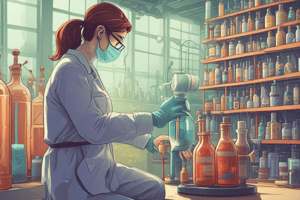Podcast
Questions and Answers
Why is compliance with legal and regulatory requirements essential in laboratories?
Why is compliance with legal and regulatory requirements essential in laboratories?
- To increase the cost of laboratory operations
- To prevent environmental contamination and protect public health (correct)
- To reduce the credibility of laboratory results
- To decrease the quality of products and services produced
What is a key purpose of accreditation for laboratories?
What is a key purpose of accreditation for laboratories?
- To reduce the competitiveness of laboratories
- To decrease adherence to standard operating procedures
- To decrease customer satisfaction
- To enhance the credibility of laboratory results (correct)
Why are quality control measures like calibration of equipment important in laboratories?
Why are quality control measures like calibration of equipment important in laboratories?
- To ensure that results are valid and reliable (correct)
- To decrease accuracy and reliability of results
- To prevent adherence to standard operating procedures
- To increase environmental contamination
What role does documentation and reporting play in laboratories?
What role does documentation and reporting play in laboratories?
How do SHEQ considerations contribute to maintaining a safe laboratory environment?
How do SHEQ considerations contribute to maintaining a safe laboratory environment?
Why is adherence to established protocols essential for high-quality laboratory operation?
Why is adherence to established protocols essential for high-quality laboratory operation?
What is the primary purpose of providing personal protective equipment (PPE) in laboratories?
What is the primary purpose of providing personal protective equipment (PPE) in laboratories?
Which regulatory body in the United States establishes standards for laboratory safety?
Which regulatory body in the United States establishes standards for laboratory safety?
What is a significant concern regarding the health of laboratory workers?
What is a significant concern regarding the health of laboratory workers?
Which legislation in the United States governs the safe disposal of hazardous waste in laboratories?
Which legislation in the United States governs the safe disposal of hazardous waste in laboratories?
Why is it important for employers to monitor air quality in laboratory work environments?
Why is it important for employers to monitor air quality in laboratory work environments?
What role do environmental regulations play in laboratories?
What role do environmental regulations play in laboratories?
Flashcards are hidden until you start studying
Study Notes
SHEQ in Labs: Legal and Regulatory Considerations
The safety, health, environment, and quality (SHEQ) aspects of laboratories are crucial for maintaining a safe and healthy working environment. These considerations are not only essential for the wellbeing of employees but also for ensuring compliance with legal and regulatory requirements.
Safety
Laboratories often deal with hazardous substances and equipment. Safety measures must be put in place to protect personnel, prevent accidents, and minimize the risk of harm. This includes providing personal protective equipment (PPE), maintaining equipment, and adhering to established safety protocols. Regulatory bodies, such as the Occupational Safety and Health Administration (OSHA) in the United States, set standards for laboratory safety and enforce them through inspections and penalties.
Health
The health of laboratory workers is a significant concern. Exposure to hazardous substances and prolonged use of PPE can lead to health problems. Employers must provide a clean and safe work environment, monitor air quality, and ensure that workers are trained in proper handling techniques.
Environment
Environmental regulations govern the disposal of hazardous materials and the management of waste in laboratories. Laboratories must comply with regulations, such as the Resource Conservation and Recovery Act (RCRA) in the United States, which establish guidelines for the safe disposal of hazardous waste. Compliance with these regulations is essential to prevent environmental contamination and protect public health.
Quality
The quality of products and services produced in laboratories is crucial for maintaining customer satisfaction and ensuring that the results are accurate and reliable. Quality control measures, such as calibration of equipment and adherence to standard operating procedures, must be implemented to ensure that the results are valid.
Legal and Regulatory Compliance
Laboratories must comply with various legal and regulatory requirements, which may vary depending on the jurisdiction. These regulations cover aspects such as safety, health, environmental protection, and quality. Compliance is essential to prevent penalties, protect the reputation of the laboratory, and ensure the safety and quality of the results produced.
Accreditation
Accreditation is a way for laboratories to demonstrate their compliance with international standards. Accreditation bodies, such as the International Laboratory Accreditation Cooperation (ILAC), assess laboratories against established criteria and provide accreditation based on their adherence to these standards. Accreditation can increase the international competitiveness of laboratories and enhance the credibility of their results.
Documentation and Reporting
Documentation and reporting are essential for maintaining accurate records of laboratory activities. Regulatory bodies may require laboratories to maintain records of safety incidents, equipment maintenance, and testing results. Proper documentation and reporting help laboratories comply with regulatory requirements and ensure transparency in their operations.
In conclusion, SHEQ considerations are crucial for maintaining a safe, healthy, and efficient laboratory environment. Compliance with legal and regulatory requirements is essential to ensure the safety of personnel, protect the environment, and maintain the credibility of the results produced. Regular inspections, training, and adherence to established protocols are essential for maintaining a high-quality laboratory operation.
Studying That Suits You
Use AI to generate personalized quizzes and flashcards to suit your learning preferences.




